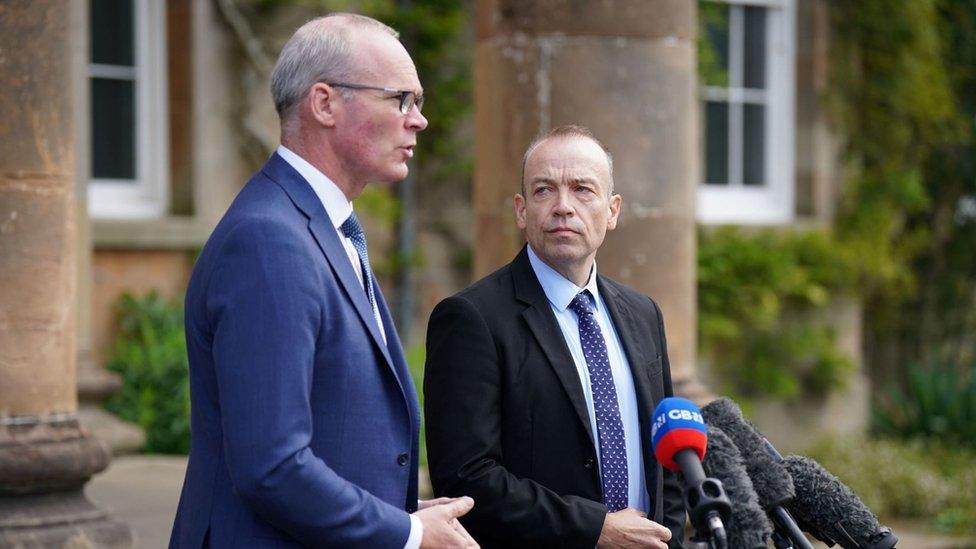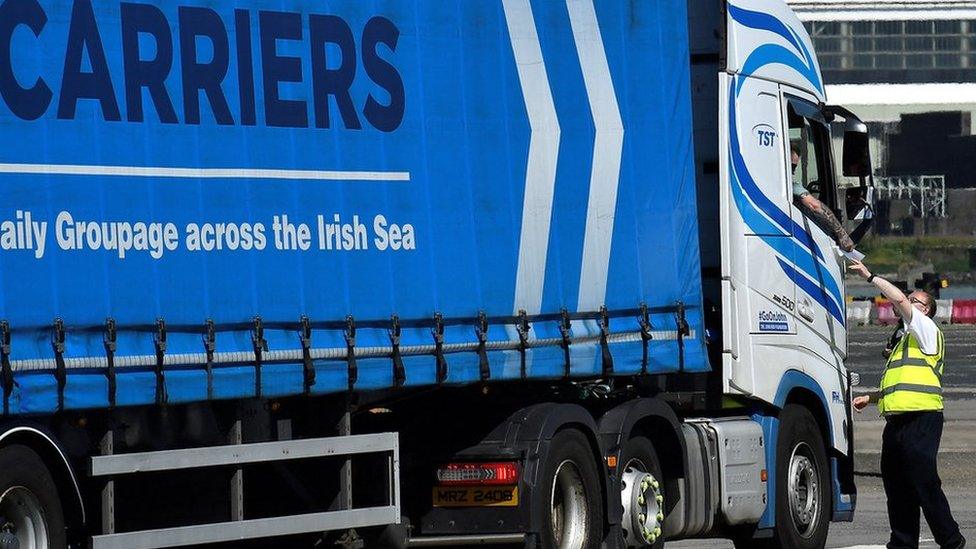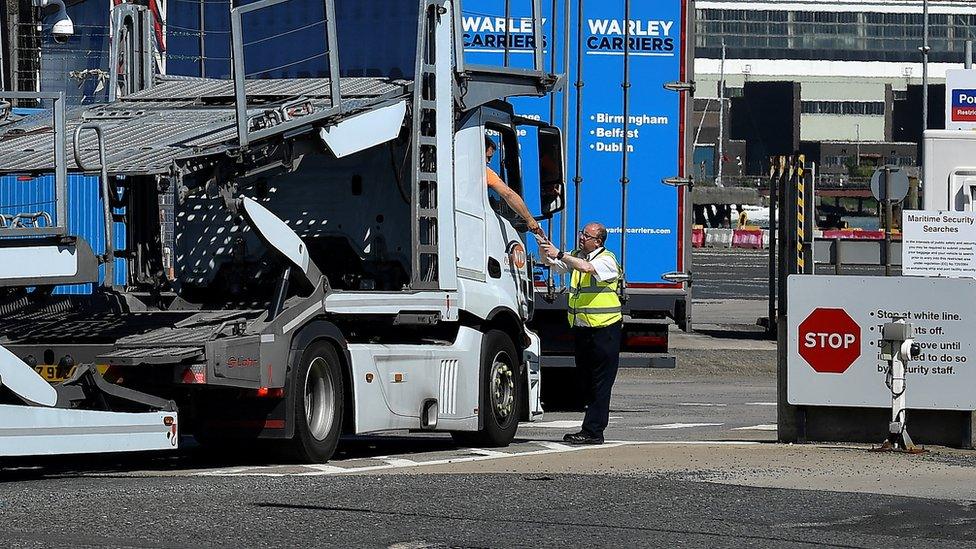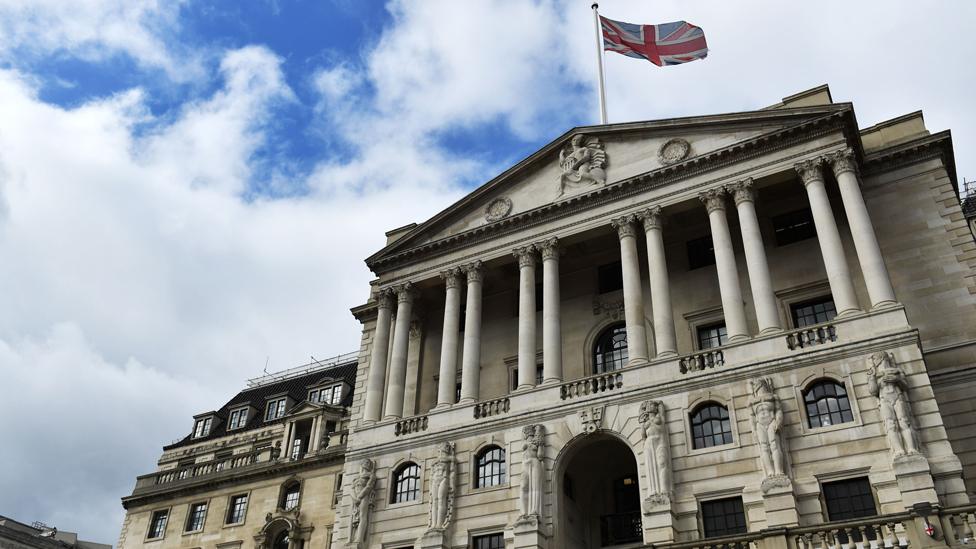Stormont: Heaton-Harris 'will call election' if executive does not return
- Published
Chris Heaton-Harris was speaking following a meeting with Ireland’s Foreign Minister Simon Coveney at Hillsborough Castle.
Northern Ireland Secretary Chris Heaton-Harris has said he will call a Stormont election if an executive is not functioning within a month.
He said he was under a legal obligation to order a vote on 28 October if politicians had not restored the devolved institutions.
"I will have to make that decision... that is just the fact," he added.
He was speaking after meeting Irish Foreign Minister Simon Coveney at Hillsborough Castle.
The met to discuss the stalemate at Stormont, where there has not been a fully-functioning executive since February.
The Democratic Unionist Party (DUP) withdrew from the executive in protest over the Northern Ireland Protocol, which is part of the post-Brexit trade agreement.
The UK government and the EU continue to discuss the Protocol, which unionist politicians argue has undermined Northern Ireland's place in the UK by introducing new checks on goods crossing the Irish Sea.
This month, the UK told the EU it would continue to delay customs checks despite legal action from Brussels.
'Failure of politics'
Mr Heaton-Harris described Mr Coveney as a "good friend and old acquaintance" and said they planned to work closely on their joint priority to see the Stormont executive restored.
In May's election, Sinn Féin emerged as the assembly's largest party, giving it the right to nominate for the position of first minister but that has not taken place.

Simon Coveney said it would be a failure of politics if there was no executive in the coming months
Mr Coveney said it would be an "extraordinary failure of politics" for Stormont to approach the 25th anniversary of the Good Friday Agreement next year with the institutions collapsed.
He said that Northern Ireland would be coming out of "a winter of discontent" with no first or deputy first ministers in place.
The politicians agreed that a solution can be reached over the Northern Ireland Protocol, which could pave the way for a return of executive ministers.
Mr Coveney said: "The messages coming out of London are quite different from what we heard a few months ago."
That was a reference to "positive" meetings between the new Prime Minister, Liz Truss, and EU Commission President Ursula Von Der Leyen.
When asked if the government was retreating from the Protocol legislation, the Northern Ireland secretary said that was not the case.
"The Protocol bill is passing through its stages and goes to the Lords next - we want a negotiated settlement here and we want to find the appropriate solutions," he said.
Both politicians are due to meet again in London next week.
Mr Heaton-Harris also defended the UK government's economic plan, which has faced criticism from opposition parties and some major financial institutions.
He said the government was delivering a "strong economy which will create wealth" and warned "economic policy takes more than a couple of days and a few headlines to come through".
On Wednesday, the Bank of England announced it would step in to calm markets after the government's tax-cutting plans caused the pound to fall.
Under the terms of the relevant legislation, if a first minister and deputy first minister are not appointed by 28 October:
Those ministers currently in post will cease to hold office
The offices of first and deputy first minister and the other ministerial offices can no longer legally be filled
In line with Standing Order 45A(4)(b), the Opposition will be dissolved
The secretary of state is required, as soon as practicable, to propose a date for an Assembly election which must take place within 12 weeks
In a letter to MLAs, Speaker of the Northern Ireland Assembly Alex Maskey said he had not planned on still being in office.
"While I am conscious of my responsibility to ensure that the remaining functions of the Speaker can still be exercised, I would prefer for a new Speaker to be elected as soon as possible," he said.
Mr Maskey added: "It is not for me to take a position on the political issues behind our current situation but no one will be surprised that the Speaker would want to see the Assembly functioning fully.
"I would therefore urge that the remaining time available is used to facilitate the resumption of normal Assembly business and the formation of an Executive."
Related topics
- Published16 September 2022

- Published22 July 2022

- Published2 February 2024

- Published28 September 2022
